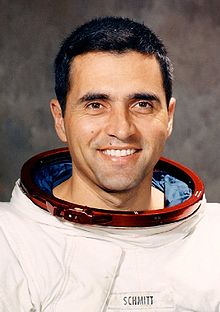Harrison Schmitt has had an impressive and storied career: Apollo astronaut and moonwalker, U.S. Senator, Ph.D. geologist. Since his recent appointment to head the New Mexico Department of Energy, Minerals, and Natural Resources, however, much attention is being focused on Schmitt’s highly unconventional views about climate change.
It’s not just that Republican Governor Susana Martinez’s new pick for the state’s top energy and environment role is a climate denier. It’s the highly politicized nature of his views and past statements–and just how wrong he is about technical matters in climate science–that’s particular stunning.
Politics first: Schmitt thinks that the environmental movement today is “what was previously considered the communist movement.” According to Schmitt, this occurred due to the fall of the Berlin wall: “the great champion of the opponents of liberty, namely communism, had to find some other place to go and they basically went into the environmental movement.” For this reason, Schmitt says, citizens need to “wake up enough so that they can take control of their government again.”
It’s bad enough to have someone who thinks this way about environmentalists heading an agency whose mandate includes environmental conservation. But in some ways still worse is what we might call Schmitt’s hyper-wrong technical arguments used to support his climate denialist position.
This issue has already been getting attention in New Mexico newspapers. And now, climate bloggers Scott Mandia and John Cook both have posts this morning about a 2009 paper on climate models that Schmitt submitted to NASA.
The 2009 paper claims, among other things, that Arctic sea ice extent had seen a recovery, so that 2009 levels were back to where they’d been 20 years earlier in 1989. But as Mandia and Cook explain, that’s simply not true. Furthermore, even if Schmitt were right about sea ice extent, extent isn’t the same as sea ice volume, as I explained in this New Scientist piece. The decline in volume is also unequivocal and probably what matters more, because thinner ice has less chance of surviving the summer melt season.
This troubling claim about sea ice is just one of many that Schmitt has used to bolster his climate denialist stance, but it’s important because it’s so stark. Will Schmitt admit he was mistaken, and Arctic sea ice is indeed in marked decline? That would be a start towards showing the scientific and environmental community that he can put public service above ideology in his new role.
Subscribe to our newsletter
Stay up to date with DeSmog news and alerts







